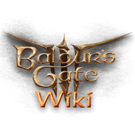10,975
editsMore actions
Restored dice terminology explanation; new BG3 players might not have DnD knowledge.
Tag: Undo |
(Restored dice terminology explanation; new BG3 players might not have DnD knowledge.) |
||
| Line 2: | Line 2: | ||
In most circumstances when a character makes a die roll their [[#Ability Score Modifier|Ability Score Modifier]] and [[#Proficiency Bonus|Proficiency Bonus]] will be added to the roll to determine the final result. The exception to this is the [[#Damage Roll|Damage Roll]], which only adds a character's proficiency bonus if explicitly stated. | In most circumstances when a character makes a die roll their [[#Ability Score Modifier|Ability Score Modifier]] and [[#Proficiency Bonus|Proficiency Bonus]] will be added to the roll to determine the final result. The exception to this is the [[#Damage Roll|Damage Roll]], which only adds a character's proficiency bonus if explicitly stated. | ||
The various types of die used in rolls are referred to by the number of sides they have: D4, D6, D8, D10, D12, and D20. When multiple dice of a type are rolled, an abbreviation is used to refer to the roll, such as 2d4 for rolling two D4, 8d6 for rolling eight D6, and so on. | |||
Some rolls need to reach a certain value to be considered a success. This is usually done with a {{D20}}, and the target value is called the Difficulty Class of the roll. Rolling a 1 on a D20 is referred to as a Natural 1 and rolling a 20 is referred to as a Natural 20. On some rolls, these can have special effects, such as automatically failing or succeeding the roll, ignoring Modifiers and Difficulty Class. | Some rolls need to reach a certain value to be considered a success. This is usually done with a {{D20}}, and the target value is called the Difficulty Class of the roll. Rolling a 1 on a D20 is referred to as a Natural 1 and rolling a 20 is referred to as a Natural 20. On some rolls, these can have special effects, such as automatically failing or succeeding the roll, ignoring Modifiers and Difficulty Class. | ||
